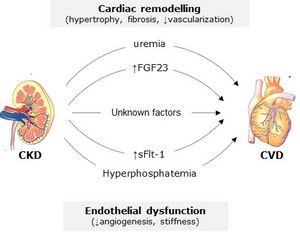
Chronic kidney disease (CKD) is a worldwide public health problem and a risk factor for cardiovascular disease (CVD). Structural cardiovascular damage that is paralleled by functional changes has been shown in response to CKD in patients and animal models. Cardiac remodelling that occurs in CKD is mainly characterized by three aspects including hypertrophy, decreased vascularization/microvascular dysfunction, and interstitial fibrosis.
In addition to traditional cardiovascular risk factors (advanced age, diabetes and hypertension), a host of complementary mechanisms or “CKD-related” factors may contribute to this increased CVD risk, such as uremic toxins, activation of the renin-angiotensin system, decreased hemoglobin levels, microalbuminuria, increased inflammation and oxidative stress, and abnormalities in bone and mineral metabolism.However, other unknown risk factors may be present.
Identification of these new players and elucidation of the involved mechanisms may reveal ways to lessen the cardiovascular risk in individuals with CKD, and open up new perspectives on the development of prognostic parameters and specific therapies for these patients.
The two major focuses of our group are:
- Heart remodelling in CKD
- Endothelial/microvascular disease and impaired angiogenesis in CKD
Our studies combine basic research with human subject research, a systematic investigation involving human biological specimens and epidemiological analysis. This strategy allows us to identify a clinical relevant problem and explore its pathophysiologic mechanisms in vitro and in animal models.

